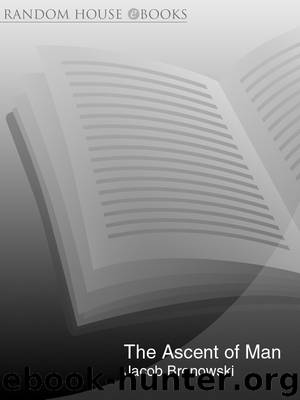The Ascent of Man by Jacob Bronowski

Author:Jacob Bronowski
Language: eng
Format: epub, mobi
ISBN: 9781446417157
Publisher: BBC Books
It took three years, from 1684 to 1687, before Newton wrote out the proof in full. Halley nursed, wheedled and even financed the Principia.
Halley’s letter to Isaac Newton when he threatened to abandon the book rather than acknowledge any claim by Robert Hooke, written on 29 June 1686.
‘Sir, I must now again beg you not to let your resentments run so high as to deprive us of your third book. Now you approve of the character and paper, I will push on the edition vigorously.’
When Newton was challenged on such questions as ‘You have not explained why gravity acts’, ‘You have not explained how action at a distance could take place’, or indeed ‘You have not explained why rays of light behave the way they do’, he always answered in the same terms: ‘I do not make hypotheses’. By which he meant, ‘I do not deal in metaphysical speculation. I lay down a law, and derive the phenomena from it’. That was exactly what he had said in his work on optics, and exactly what had not been understood by his contemporaries as a new outlook in optics.
Now if Newton had been a very plain, very dull, very matter-of-fact man, all that would be easily explicable. But I must make you see that he was not. He was really a most extraordinary, wild character. He practised alchemy. In secret, he wrote immense tomes about the Book of Revelation. He was convinced that the law of inverse squares was really already to be found in Pythagoras. And for such a man, who in private was full of these wild metaphysical and mystical speculations, to hold this public face and say, ‘I make no hypotheses’ – that is an extraordinary expression of his secret character. William Wordsworth in The Prelude has a vivid phrase,
Newton, with his prism and silent face,
which sees and says it exactly.
Well, the public face was very successful of course, Newton could not get promotion in the University, because he was a Unitarian – he did not accept the doctrine of the Trinity, with which scientists in his time were temperamentally ill at ease. Therefore he could not become a parson, therefore he could not possibly become the Master of a College. So, in 1696, Newton went to London to the Mint. In time he became Master of the Mint. After Hooke’s death he accepted the Presidency of the Royal Society in 1703. He was knighted by Queen Anne in 1705. And to his death in 1727 he dominated the intellectual landscape of London. The village boy had made good.
The sad thing is that I think he had made good not by his own standards, but only by the standards of the eighteenth century. The sad thing is that it was that society whose criterion he accepted, when he was willing to be a dictator in the councils of the Establishment and count that success.
An intellectual dictator is not a sympathetic figure, even when he has risen from humble beginnings.
Download
This site does not store any files on its server. We only index and link to content provided by other sites. Please contact the content providers to delete copyright contents if any and email us, we'll remove relevant links or contents immediately.
| Africa | Americas |
| Arctic & Antarctica | Asia |
| Australia & Oceania | Europe |
| Middle East | Russia |
| United States | World |
| Ancient Civilizations | Military |
| Historical Study & Educational Resources |
Underground: A Human History of the Worlds Beneath Our Feet by Will Hunt(12099)
Sapiens by Yuval Noah Harari(5372)
Navigation and Map Reading by K Andrew(5158)
The Sympathizer by Viet Thanh Nguyen(4393)
Barron's AP Biology by Goldberg M.S. Deborah T(4150)
5 Steps to a 5 AP U.S. History, 2010-2011 Edition (5 Steps to a 5 on the Advanced Placement Examinations Series) by Armstrong Stephen(3736)
Three Women by Lisa Taddeo(3434)
Water by Ian Miller(3188)
The Comedians: Drunks, Thieves, Scoundrels, and the History of American Comedy by Nesteroff Kliph(3079)
Drugs Unlimited by Mike Power(2594)
A Short History of Drunkenness by Forsyth Mark(2297)
DarkMarket by Misha Glenny(2212)
And the Band Played On by Randy Shilts(2210)
The House of Government by Slezkine Yuri(2206)
The Library Book by Susan Orlean(2072)
Revived (Cat Patrick) by Cat Patrick(1993)
The Woman Who Smashed Codes by Jason Fagone(1973)
The Absolutely True Diary of a Part-Time Indian by Sherman Alexie(1913)
Birth by Tina Cassidy(1905)
